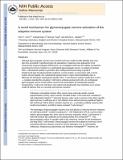A novel mechanism for glycoconjugate vaccine activation of the adaptive immune system
Citation
Avci, Fikri Y., Xiangming Li, Moriya Tsuji, and Dennis L. Kasper. 2012. A novel mechanism for glycoconjugate vaccine activation of the adaptive immune system. Nature Medicine 17(12): 1602-1609.Abstract
Although glycoconjugate vaccines have provided enormous health benefits globally, they have been less successful in significant high-risk populations. Exploring novel approaches to the enhancement of glycoconjugate effectiveness, we investigated molecular and cellular mechanisms governing the immune response to a prototypical glycoconjugate vaccine. In antigen-presenting cells, a carbohydrate epitope is generated upon endolysosomal processing of group B streptococcal type III polysaccharide coupled to a carrier protein. In conjunction with a carrier protein-derived peptide, this carbohydrate epitope binds to major histocompatibility class II (MHCII) and stimulates carbohydrate-specific CD4+ T-cell clones to produce interleukins 2 and 4—cytokines essential for providing T-cell help to antibody-producing B cells. An archetypical glycoconjugate vaccine constructed to maximize the presentation of carbohydrate epitopes recognized by T cells is 50–100 times more potent and significantly more protective in an animal model of infection than is a currently used vaccine construct.Other Sources
http://www.ncbi.nlm.nih.gov/pmc/articles/PMC3482454/pdf/Terms of Use
This article is made available under the terms and conditions applicable to Other Posted Material, as set forth at http://nrs.harvard.edu/urn-3:HUL.InstRepos:dash.current.terms-of-use#LAACitable link to this page
http://nrs.harvard.edu/urn-3:HUL.InstRepos:10531922
Collections
- HMS Scholarly Articles [17921]
Contact administrator regarding this item (to report mistakes or request changes)



